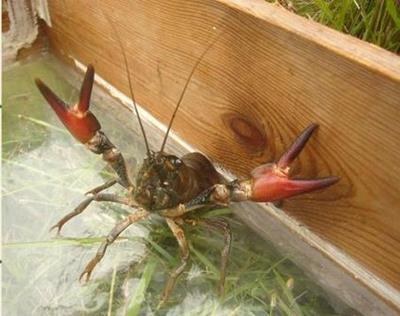The Angling Trust and CEFAS today announced trials to find ways of reducing the impact of signal crayfish on English water bodies.
CEFAS (the Centre for Environment, Fisheries & Aquaculture Science) and the Angling Trust have joined forces to try and find the most effective way of reducing signal crayfish numbers and their impacts on our aquatic wildlife. The Defra-funded project is supported by an army of volunteers from angling clubs and others with an interest in the conservation of their local rivers, lakes and canals.
The volunteers will be supported by CEFAS scientists who will analyse the results of the study. The aim is to produce a guide to water managers on the most efficient way of reducing signal crayfish numbers.
The study will also provide some useful insights into the challenges and opportunities posed by different angling venues, including public access and mixed-use waters.
Signal crayfish have been rapidly invading our waterways since the 1970s, predating on fish, fish eggs, invertebrates, and burrowing into banks causing them to collapse. They are the biggest threat to our native white clawed crayfish through predation, and passing on the deadly crayfish plague that they carry but against which our native species have no immunity.
The work is also being supported by the Environment Agency and Natural England with further investigations underway to look at alternative methods of control such as male sterilisation.

Environment Minister Lord de Mauley said:
“Signal crayfish are damaging our native aquatic life and eroding our riverbanks, but with volunteers and scientists working together, we will be able to identify the most effective ways of reducing the destruction they are causing to our waterways.”
Mark Lloyd, Chief Executive of the Angling Trust, said:
“One of the most common issues our members contact us about is that of non-native crayfish invading rivers, lakes and canals. They are known to damage fish stocks by eating eggs and young fish, and they can make many fishing techniques impossible because as soon as the bait hits the bottom it is grabbed by a crayfish claw. This can seriously affect the sales of angling permits and licences, which damages rural businesses that rely on anglers for income.”
He added: “The Angling Trust is very keen to find a solution to this widespread issue to help protect fish stocks and fishing for the benefit of all anglers and the water environment. We all hope very much that these trials will be successful so that we can then look at expanding them to the rest of the country and bring these alien invaders under control.”








